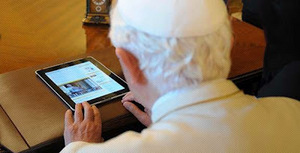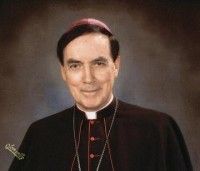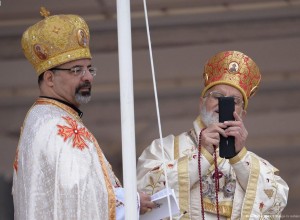Tag: social media
Rediscover the Faith by sharing it with joy, making disciples, Pope Francis encourages on World Mission Day 2013
This year, as we celebrate World Mission Day, the Year of Faith, which is an important opportunity to strengthen our friendship with the Lord and our journey as a Church that preaches the Gospel with courage, comes to an end. From this perspective, I would like to propose some reflections.
1. Faith is God’s precious gift, which opens our mind to know and love him. He wants to enter into relationship with us and allow us to participate in his own life in order to make our life more meaningful, better and more beautiful. God loves us! Faith, however, needs to be accepted, it needs our personal response, the courage to entrust ourselves to God, to live his love and be grateful for his infinite mercy. It is a gift, not reserved for a few but offered with generosity. Everyone should be able to experience the joy of being loved by God, the joy of salvation! It is a gift that one cannot keep to oneself, but it is to be shared. If we want to keep it only to ourselves, we will become isolated, sterile and sick Christians. The proclamation of the Gospel is part of being disciples of Christ and it is a constant commitment that animates the whole life of the Church. Missionary outreach is a clear sign of the maturity of an ecclesial community” (BENEDICT XVI, Verbum Domini, 95). Each community is “mature” when it professes faith, celebrates it with joy during the liturgy, lives charity, proclaims the Word of God endlessly, leaves one’s own to take it to the “peripheries”, especially to those who have not yet had the opportunity to know Christ. The strength of our faith, at a personal and community level, can be measured by the ability to communicate it to others, to spread and live it in charity, to witness to it before those we meet and those who share the path of life with us.
2. The Year of Faith, fifty years after the beginning of the Second Vatican Council, motivates the entire Church towards a renewed awareness of its presence in the contemporary world and its mission among peoples and nations. Missionary spirit is not only about geographical territories, but about peoples, cultures and individuals, because the “boundaries” of faith do not only cross places and human traditions, but the heart of each man and each woman. The Second Vatican Council emphasized in a special way how the missionary task, that of broadening the boundaries of faith, belongs to every baptized person and all Christian communities; since “the people of God lives in communities, especially in dioceses and parishes, and becomes somehow visible in them, it is up to these to witness Christ before the nations” (Ad gentes, 37). Each community is therefore challenged, and invited to make its own, the mandate entrusted by Jesus to the Apostles, to be his “witnesses in Jerusalem, throughout Judea and Samaria and to the ends of the earth” (Acts 1:8) and this, not as a secondary aspect of Christian life, but as its essential aspect: we are all invited to walk the streets of the world with our brothers and sisters, proclaiming and witnessing to our faith in Christ and making ourselves heralds of his Gospel. I invite Bishops, Priests, Presbyteral and Pastoral Councils, and each person and group responsible in the Church to give a prominent position to this missionary dimension in formation and pastoral programmes, in the understanding that their apostolic commitment is not complete unless it aims at bearing witness to Christ before the nations and before all peoples. This missionary aspect is not merely a programmatic dimension in Christian life, but it is also a paradigmatic dimension that affects all aspects of Christian life.
3. The work of evangelization often finds obstacles, not only externally, but also from within the ecclesial community. Sometimes there is lack of fervour, joy, courage and hope in proclaiming the Message of Christ to all and in helping the people of our time to an encounter with him. Sometimes, it is still thought that proclaiming the truth of the Gospel means an assault on freedom. Paul VI speaks eloquently on this: “It would be… an error to impose something on the consciences of our brethren. But to propose to their consciences the truth of the Gospel and salvation in Jesus Christ, with complete clarity and with total respect for free options which it presents… is a tribute to this freedom” (Evangelii Nuntiandi, 80). We must always have the courage and the joy of proposing, with respect, an encounter with Christ, and being heralds of his Gospel. Jesus came among us to show us the way of salvation and he entrusted to us the mission to make it known to all to the ends of the earth. All too often, we see that it is violence, lies and mistakes that are emphasized and proposed. It is urgent in our time to announce and witness to the goodness of the Gospel, and this from within the Church itself. It is important never to forget a fundamental principle for every evangelizer: one cannot announce Christ without the Church. Evangelization is not an isolated individual or private act; it is always ecclesial. Paul VI wrote, “When an unknown preacher, catechist or Pastor, preaches the Gospel, gathers the little community together, administers a Sacrament, even alone, he is carrying out an ecclesial act.” He acts not “in virtue of a mission which he attributes to himself or by a personal inspiration, but in union with the mission of the Church and in her name” (ibid. 60). And this gives strength to the mission and makes every missionary and evangelizer feel never alone, but part of a single Body animated by the Holy Spirit.
4. In our era, the widespread mobility and facility of communication through new media have mingled people, knowledge, experience. For work reasons, entire families move from one continent to another; professional and cultural exchanges, tourism, and other phenomena have also led to great movements of peoples. This makes it difficult, even for the parish community, to know who lives permanently or temporarily in the area. More and more, in large areas of what were traditionally Christian regions, the number of those who are unacquainted with the faith, or indifferent to the religious dimension or animated by other beliefs, is increasing. Therefore it is not infrequent that some of the baptized make lifestyle choices that lead them away from faith, thus making them need a “new evangelization“. To all this is added the fact that a large part of humanity has not yet been reached by the good news of Jesus Christ. We also live in a time of crisis that touches various sectors of existence, not only the economy, finance, food security, or the environment, but also those involving the deeper meaning of life and the fundamental values that animate it. Even human coexistence is marked by tensions and conflicts that cause insecurity and difficulty in finding the right path to a stable peace. In this complex situation, where the horizon of the present and future seems threatened by menacing clouds, it is necessary to proclaim courageously and in very situation, the Gospel of Christ, a message of hope, reconciliation, communion, a proclamation of God’s closeness, his mercy, his salvation, and a proclamation that the power of God’s love is able to overcome the darkness of evil and guide us on the path of goodness. The men and women of our time need the secure light that illuminates their path and that only the encounter with Christ can give. Let us bring to the world, through our witness, with love, the hope given by faith! The Church’s missionary spirit is not about proselytizing, but the testimony of a life that illuminates the path, which brings hope and love. The Church – I repeat once again – is not a relief organization, an enterprise or an NGO, but a community of people, animated by the Holy Spirit, who have lived and are living the wonder of the encounter with Jesus Christ and want to share this experience of deep joy, the message of salvation that the Lord gave us. It is the Holy Spirit who guides the Church in this path.
5. I would like to encourage everyone to be a bearer of the good news of Christ and I am grateful especially to missionaries, to the Fidei Donum priests, men and women religious and lay faithful – more and more numerous – who by accepting the Lord’s call, leave their homeland to serve the Gospel in different lands and cultures. But I would also like to emphasize that these same young Churches are engaging generously in sending missionaries to the Churches that are in difficulty – not infrequently Churches of ancient Christian tradition – and thus bring the freshness and enthusiasm with which they live the faith, a faith that renews life and gives hope. To live in this universal dimension, responding to the mandate of Jesus: “Go therefore and make disciples of all nations” (Mt 28, 19) is something enriching for each particular Church, each community, because sending missionaries is never a loss, but a gain. I appeal to all those who feel this calling to respond generously to the Holy Spirit, according to your state in life, and not to be afraid to be generous with the Lord. I also invite Bishops, religious families, communities and all Christian groups to support, with foresight and careful discernment, the missionary call ad gentes and to assist Churches that need priests, religious and laity, thus strengthening the Christian community. And this concern should also be present among Churches that are part of the same Episcopal Conference or Region, because it is important that Churches rich in vocations help more generously those that lack them.
At the same time I urge missionaries, especially the Fidei Donum priests and laity, to live with joy their precious service in the Churches to which they are sent and to bring their joy and experience to the Churches from which they come, remembering how Paul and Barnabas at the end of their first missionary journey “reported what God had done with them and how he had opened the door of faith to the Gentiles” (Acts 14:27). They can become a path to a kind of “return” of faith, bringing the freshness of the young Churches to Churches of ancient Christian tradition, and thus helping them to rediscover the enthusiasm and the joy of sharing the faith in an exchange that is mutual enrichment in the journey of following the path of the Lord.
The concern for all the Churches that the Bishop of Rome shares with his brother Bishops finds an important expression in the activity of the Pontifical Mission Societies, which are meant to animate and deepen the missionary conscience of every baptized Christian, and of every community, by reminding them of the need for a more profound missionary formation of the whole People of God and by encouraging the Christian community to contribute to the spread of the Gospel in the world.
Finally I wish to say a word about those Christians who, in various parts of the world, experience difficulty in openly professing their faith and in enjoying the legal right to practice it in a worthy manner. They are our brothers and sisters, courageous witnesses – even more numerous than the martyrs of the early centuries – who endure with apostolic perseverance many contemporary forms of persecution. Quite a few also risk their lives to remain faithful to the Gospel of Christ. I wish to reaffirm my closeness in prayer to individuals, families and communities who suffer violence and intolerance, and I repeat to them the consoling words of Jesus: “Take courage, I have overcome the world” (Jn16:33).
Benedict XVI expressed the hope that: “The word of the Lord may spread rapidly and be glorified everywhere” (2 Thes 3:1): May this Year of Faith increasingly strengthen our relationship with Christ the Lord, since only in him is there the certitude for looking to the future and the guarantee of an authentic and lasting love” (Porta fidei, 15). This is my wish for World Mission Day this year. I cordially bless missionaries and all those who accompany and support this fundamental commitment of the Church to proclaim the Gospel to all the ends of the earth. Thus will we, as ministers and missionaries of the Gospel, experience “the delightful and comforting joy of evangelizing” (PAUL VI, Evangelii Nuntiandi, 80).
From the Vatican, 19 May 2013, Solemnity of Pentecost
FRANCIS
The Digital Nun: A Benedictine continuity in social media
Can you believe that Benedictines can do anything in addition to prayer, and more prayer? Well, I hope so. Benedictines and nuns to boot, have given the world lots of innovative things that continue to use today. For example, writing, singing different forms of music, social communications, different forms of alcohol, etc.
The Benedictines are always interesting people, whether in the 9th century, 18th century or the 21st century. Sister Catherine Wybourne, OSB, and the nuns of Holy Trinity Monastery (Howton Grove, Herefordshire, UK).
Sister Catherine is the prioress of the Benedictine nuns at this small monastery with competencies in the secular world and in the world of God and the Church.
Sister Catherine and the nuns of Holy Trinity Monastery engage us on level of faith formation, the Benedictine Charism and social communications. Her disposability for the sake of Christ’s Gospel and His Church.
Listen to Laura Lynch’s interview of Sister Catherine. You won’t be disappointed.
And if you are still interested in social media and the search of God, or least the perspective of this Benedictine nun, Dame Catherine, may I suggest:
- “How Many iPhone Developers Wear Wimples?” (WSJ, May 2, 2011)
- “Catherine Wybourne: The Digital Nun“
- Prayer and Work (1994) with Dom Columba Cary-Elwes (who by the way is the founding prior of St Louis Abbey)
Tweeting. Are you? Join me.
Benedict XVI to tweet… join in
You heard yesterday that Pope Benedict XVI is now tweeting. Terrific!
The Papal Twitter account is up and running: @Pontifex
As of right now, the English page has 381K followers, the German has 9.5K, the Spanish 88K, the Italian has 36K, the French has 7k and the Arabic has 3,000.
The Press Office of the Holy See said the following about the Papal presence in the digital media.
The The Pope’s presence on Twitter
is a concrete expression of his conviction that the Church must be present in
the digital arena. This initiative is best understood in the context of his
reflections on the importance of the cultural space that has been brought into
being by the new technologies. In his Message for World Communications Day
2009, which was published on the same day as the Vatican’s Youtube channel was
opened, Pope Benedict spoke of the necessity of evangelizing the ‘digital
continent’ and he invited young believers, in particular, to introduce
into the culture of this new environment of communications and information
technology the values on which you have built your lives.
Speaking of God in 140 characters
 The Pope will tweet. Is this a mortal sin or a gospel value?
The Pope will tweet. Is this a mortal sin or a gospel value?
writes of Pope Benedict’s latest venture into tweeting. The Pope is not going to give up his love of books, old fashion research and handwriting his talks, but he’s diving into more deeply in the digital world. He’ll have to keep his message
to 140 characters. Can he do it? I am sure the clarity of the Pope can be
limited to a mere 140 characters. It’s ancient history now in cyberworld but it
was June 2011 that the Holy Father touched his own iPad launching the Vatican’s
News.va portal; tweeting in five languages
is a polymath way of communicating
at the Vatican.
Council for Social Communications since 2007, last week delivered his keynote address at
the 100th anniversary of Our Sunday Visitor. Celli has been hardworking in
moving the Holy See into the 21st century with an acceptance of social media and its benefits for communicating the gospel effectively today.
Archbishop of Hartford Henry Mansell blogs, tweets
 Today, as you know the Church begins a Year of Faith. We also observe today the 50th anniversary of the Second Vatican Council. Not least in the list of initiatives is the inauguration of a blog written by Archbishop Henry J. Mansell, the archbishop of Hartford.
Today, as you know the Church begins a Year of Faith. We also observe today the 50th anniversary of the Second Vatican Council. Not least in the list of initiatives is the inauguration of a blog written by Archbishop Henry J. Mansell, the archbishop of Hartford.
Church thinking about social communication
How theologians might reflect on communication and information technologies and the new culture that they create formed the basis of a symposium sponsored by the Pontifical Council on Social Communication, held at the Jesuit-sponsored Santa Clara University in California (USA) in late June. The PCCS, along with the United States Conference of Catholic Bishops’ Committee on Communications and the University’s Communication Department, convened a gathering of 25 theologians to begin a process of sustained theological reflection. The group focused on three general areas: ecclesiology, approaches from historical theology, and a theological understanding of digital culture, in each area considering the challenges that contemporary communication poses to the church’s theological understanding.
Communication, whether the mass media or the Internet, has changed the environment in which people live, raising questions about church structure, personal identity, parish life, religious self-understanding, and religious formation and participation. For example, people take their identity from popular culture more than from the Church’s catechetics or even from the Gospel. The same mass media also promote a vertical model of the Church in which the local community, the parish, and the diocese disappear, so that only “the Catholic Church” headed by the Pope matters. Each of these poses a serious ecclesiological challenge, as each redefines the nature of the Church.
To read the whole article, see the text here.
Honoring the inner monk
 The monks of Saint Meinrad Archabbey are gaining traction in the use of social media to promote prayer, the monastic life and ecclesial service.
The monks of Saint Meinrad Archabbey are gaining traction in the use of social media to promote prayer, the monastic life and ecclesial service.
Christ on the silver screen –Momentum Studios
The laity are stepping up to the plate to evangelize because it is part of the baptismal call to make disciples of all nations. We are now seeing more and more talented young people coming forward to share with the world the Truth of the faith proposed by Christ for our salvation. Two men from Saint Mary’s Church (Greenville, SC) pastored by Father Jay Scott Newman, have formed The Momentum Studios as a Catholic company that aims to ignite our enthusiasm, adherence and love for Christ and His Church.





